|
|
Reviewed by Glenn Erickson
Twilight Time has done Sam Peckinpah fans a big favor with this new disc. Less than a year after a viewable videotape copy was rediscovered, they've released on Blu-ray the writer-director's near-legendary Noon Wine, a television drama from 1966 starring Olivia de Havilland, Jason Robards Jr. and Per Oscarsson. In each of several Peckinpah biographies Noon Wine is cited as the turning point in his career, a critical success that took his name off the 'unemployable' lists and enabled him to make his masterpiece The Wild Bunch. Screened once when new and never again, Noon Wine is slotted as a special extra for Peckinpah's The Killer Elite, one of his least interesting movies yet still a noted title among action fans. As a further nod to the Peckinpah faithful, Twilight Time has rounded up some good extras, including a docu featurette by Mike Siegel.
The Killer Elite
1975 / Color / 2:35 widescreen / 123 min.
Starring James Caan, Robert Duvall, Arthur Hill, Bo Hopkins, Mako, Burt Young, Gig Young, Tiana (Alexandra), Walter Kelley, Sondra Blake, Victor Sen Young, Uschi Digard.
Cinematography Philip Lathrop
Production Designer Ted Haworth
Stunt Supervisor Whitey Hughes
Film Editors Garth Craven, Tony De Zarraga, Monte Hellman
Original Music Jerry Fielding
Written by Stirling Silliphant, Marc Norman from a novel by Robert Rostand
Produced by Martyin Baum, Arthur Lewis, Helmut Dantine
Directed by Sam Peckinpah
The main feature The Killer Elite is an action-thriller from 1975, a tough-guy tale about private-sector black-ops agents who work as contractees for the C.I.A., the secret service, the P.T.A., what have you. Its strong cast and classy production are topped by Philip Lathrop's first -rank cinematography. We're even given another classy Jerry Fielding music score, with the added Twilight Time benefit of an Isolated Score Track. With all that going for it, it's too bad that The Killer Elite is such a cinematic and genre lightweight.
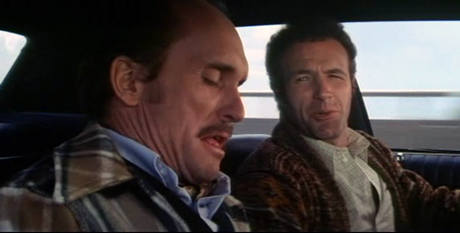
Mike Locken and George Hansen (James Caan & Robert Duvall) are working a shift for a 'security' company run by corporate types Cap Hollis and Lawrence Weyburn, safeguarding very important defector Vorodny (Helmut Dantine). But their perfect partnership dissolves when George sells out to 'the opposition'. He murders Vorodny and shoots Mike in the elbow and knee. George's idea of friendship is to force Mike's retirement as a cripple, rather than kill him. After a painful recovery Mike returns on a cane, determined to someday catch up with his buddy gone bad. The opportunity comes sooner than later when Weyburn tells Mike about an 'important Oriental politician' (Mako) who needs protection from a gang of ninja assassins. Normally Mike wouldn't qualify for any assignment, but Weyburn has another important piece of information -- George Hansen is playing on the other team. Mike rounds up two old pals to help him in his double-edged mission: 'crazy' marksman Jerome Miller (Bo Hopkins) and driver/mechanic Mac (Burt Young). Thus begins 48 hours that turn San Francisco into a shooting gallery.
The Killer Elite opens marvelously, with James Caan and Robert Duvall making a great buddy team. Caan's Locken is a philosophical jock in bell-bottom pants, and Duvall's Hansen is a wicked joker in all respects. Together they raise the acting bar as high as any of Peckinpah's leading characters. Any sane script would keep these two actors together, fighting bad guys. We instead spend 80% of the movie watching Caan's recovery and rather illogical undercover mission. Duvall drops into the background after the first fifteen minutes, to reappear only once or twice, in uninspired situations that do little to advance the theme of friendship and betrayal.
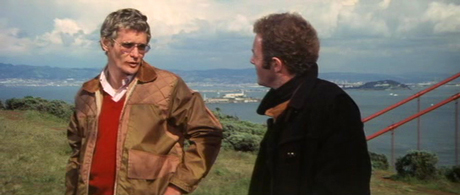
Action-wise things are fine until the script insists on dragging us into martial arts territory. By 1975 American audiences had seen plenty of high quality Kung-fu and samurai action courtesy of Bruce Lee epics and Toho imports. The action scenes in The Killer Elite are simply laughable. Peckinpah's stuntmen and editors insist on cutting the action into small bits, which destroys any sense of skill or even continuity. Editorially, samurai combat and chop-socky moves are like the dancing content in a musical. The action needs to be seen in unbroken cuts, to convince the audience that anything impressive is happening.
The story makes almost no sense, as if the producers were relying on Peckinpah's name to pull in the audience. Mike Locken doesn't protect his client and the bad guys run around in the dark instead of shooting their quarry while they have the chance. An elaborate finale aboard a mothball fleet North of San Francisco bay is just silly -- important revolutionary figure Mako suddenly feels the need to swordfight with the leader of the assassins.
The macho camaraderie between Caan, Peckinpah veteran Bo Hopkins and future Rocky sidekick Burt Young is the best thing in the picture, with some good wisecracks in between the usual sexist baloney: "Do you like stewardesses?" The show succumbs to faux-existential nonsense when Burt Young's Mac suddenly becomes Locken's poetic conscience, nagging him about the futility of revenge, and counseling him that his employers are not to be trusted. And sure enough, Gig Young and Arthur Hill turn out to rotten representatives of the dreaded 'power system', as Mac terms it. That's deep, Sam.
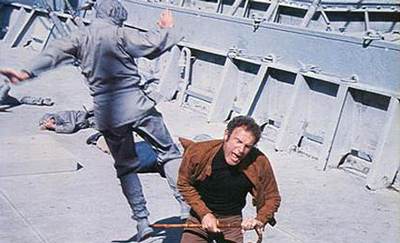
The show has its share of impressive scenes, such as a shootout in Chinatown and a breezy meeting on a hill north of the Golden Gate Bridge. The surgery scenes are also okay, except that we'd think Mike should really be out for the count if those two key body parts were shot away -- I don't think they had today's bio-miracle joint replacements in 1975. Detracting from the fun is the film's general air of misogyny. Playboy-cad Mike forms a warm relationship with a nurse but then dumps her, and doesn't even come back for her when he sets out on a long-deserved sailing vacation. His only other love interest is the "Chinese chick" Tommie (Tiana). She tells him that she's a virgin, and gets told in return that Mike doesn't give a s___. That sure shuts her up. Just call Mike the 'Stinker Elite'.
Besides the Isolated Score Track, the extras include an audio commentary with Peckinpah biographers Paul Seydor and Garner Simmons, moderated by TT impresario Nick Redman. From 2012 comes a making-of docu by Mike Siegel, which uses many star interviews to sketch Peckinpah's creative state of affairs during this time, which included a major cocaine problem. We also find out that Tiana was screenwriter Stirling Silliphant's girl, and part of his writing fee included giving her a part in the picture. Built up as a ninja dervish, Tommie turns out to be a big flop as a shadow warrior. A poster gallery, TV & radio spots and a trailer are also included.
Noon Wine
1966 / Color / 1:33 flat 1" video / 51 min.
Starring Jason Robards, Olivia de Havilland, Theodore Bikel, Per Oscarsson, Robert Emhardt, Steve Sanders, Ben Johnson, Peter Robbins, L.Q. Jones, Jill Andre, Joan Tompkins.
Cinematography Lucien Ballard
Production Design Walter Scott Herndon
Film Editor Art Schneider
Original Music Jerry Fielding
Written by Sam Peckinpah from the short novel by Katherine Anne Porter
Produced by Daniel Melnick, ABC Stage 67
Directed by Sam Peckinpah
Given a place of honor on the extras menu is Noon Wine, Sam Peckinpah's big comeback show from the year after his Hollywood career was decreed D.O.A. The debacle of Major Dundee and a seemingly retaliatory firing from the Steve McQueen movie The Cincinnatti Kid had made Sam persona non grata for almost two full years, before TV producer Daniel Melnick tapped him to adapt and direct Katherine Ann Porter's novel for the small screen. Peckinpah's U.S.C. theater experience had prepared him for the task, as had his family background in pioneer California. Surely convinced that destiny had given him a second chance, Peckinpah applied himself fully to the show, which turned out to be the perfect career lifeboat. He treated the demanding, old-school star Olivia de Havilland with respect and turned out an hour of Televison that wowed critics, reminding them of the quality dramas of the earlier decade. With these rave reviews Peckinpah's sins were redeemed enough to allow him to slip right back into feature film work.
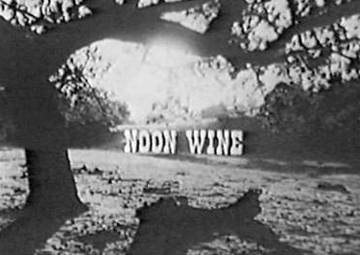
Note: These snaps are B&W but Noon Wine is in Color
Faithfully following Katherine Anne Porter's celebrated short novel, Noon Wine tells the story of lazy farmer Royal Thompson (Jason Robards) and his frail wife Ellie (de Havilland). Their prospects take a turn for the better when Royal hires on Olaf Helton (Per Oscarsson), an odd, uncommunicative drifter who asks for a job. Experienced and hardworking, Helton shapes up the farm in no time, and the Thompsons enjoy four years of prosperity. Helton remains a maladjusted loner, but he's shown respect and kindness. Then bounty hunter Homer Hatch (Theodore Bikel) appeaers, produces a pair of manacles and demands that Royal help him subdue Olaf for transport back up North -- the Swede is an escaped mental patient who has already killed his own brother. Royal objects but his arguments about Olaf's regeneration do no good. A scuffle ensues and things get out of hand...
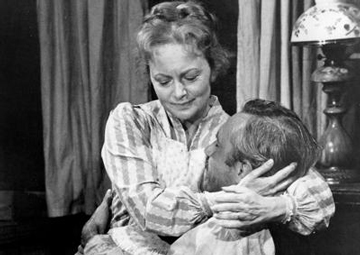
Peckinpah's adaptation of the compact story is practically perfect. After a slow start the characterizations seem natural and believable. Robards gives one of his best and most controlled performances. Peckinpah employs interesting montages to cover parts of the story, but never loses his focus on the disintegrating Thompson marriage. It's so well done that we can't see the end coming, even when it should have been obvious. Porter's grim story never feels unduly pessimistic, as we feel like we've gained insights to the human character. We can see how audiences and critics in 1966 might brand this as high-class TV fare.
Again with Seydor, Simmons and Redman, the commentary explains why this show is now an obscurity. It was aired only once and then junked by ABC TV. Until just a year ago it existed only on an inferior kinescope held by a TV museum. A 1" color dub was discovered in David Susskind's effects and recently re-premiered. The Peckinpah-friendly disc label Twilight Time snapped it up for Blu-ray.
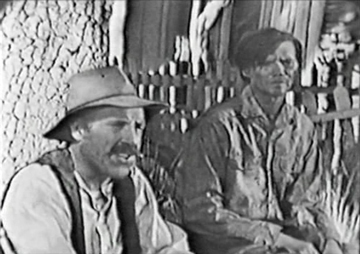
The quality is limited by the 1" NTSC video source, which has a few video hits and prominent color banding -- making quality dubs from original 2" Quad video was not easy. Videotape standards in the 1960s were not outstanding either. We're told that the show is a mix of film and video, but if film was used for some outdoor scenes, it had to be transferred to video before editing, and in 1966 that didn't yield a particularly attractive result. Some if not all of the exterior dialogue scenes appear to have been shot on video.
The good direction favors the actors at all times. Those montage sequences are beautifully done but we also see all the flaws of the old video process. Knowing that home TVs would sharply crop the video image, the framing is left wide. In many shots the lens doesn't even cover the entire 1:33 frame, leaving crescents of black in the corners.
The Twilight Time Blu-ray of The Killer Elite + Noon Wine is going to be an irresistible lure for Peckinpah fans. The Killer Elite is a known quantity that looks and sounds great in HD picture and sound. Noon Wine shows its age visually yet it shapes up as one of the director's
 most interesting achievements. In the 1970s we often read in the trades that Sam was preparing feature projects that were neither westerns nor action sagas, like Ray Bradbury's Something Wicked This Way Comes. The man had a talent for straight drama, which can also be seen in his impressive Junior Bonner. Had his career and personal choices gone in a different direction, it's obvious that he could have continued as a top-rank writer-director.
most interesting achievements. In the 1970s we often read in the trades that Sam was preparing feature projects that were neither westerns nor action sagas, like Ray Bradbury's Something Wicked This Way Comes. The man had a talent for straight drama, which can also be seen in his impressive Junior Bonner. Had his career and personal choices gone in a different direction, it's obvious that he could have continued as a top-rank writer-director.
On a scale of Excellent, Good, Fair, and Poor,
The Killer Elite + Noon Wine Blu-ray rates:
Movie: The Killer Elite Fair; Noon Wine Excellent
Video: The Killer Elite Excellent; Noon Wine Fair yet fine considering that we're lucky the show exists at all.
Sound: The Killer Elite Excellent ; Noon Wine Good
Supplements: Commentaries on both shows; a Mike Siegel docu, poster art, trailer, TV spots, etc; Julie Kirgo insert pamphlet liner notes.
Deaf and Hearing Impaired Friendly?
The Killer Elite YES Subtitles: English; Noon Wine NO
Packaging: 1 Blu-ray in Keep case
Reviewed: September 21, 2014

Text © Copyright 2014 Glenn Erickson
See more exclusive reviews on the Savant Main Page.
Reviews on the Savant main site have additional credits information and are often updated and annotated with reader input and graphics.
T'was Ever Thus.
Return to Top of Page
|

